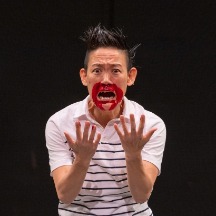Aya Ogawa, wrote, directs, and stars in Nosebleed, an autobiographical performance that uses light humor and pain to chronicle her relationship with her father. Ogawa’s play begins with her childhood nosebleed and exacerbated response to draw the audience into sharing common experiences.
Throughout the play, six actors often switch genders and engage the audience with a ribbon of questions about unresolved childhood issues to further bring identification with Ogawa’s own childhood, relationships, and parenting experiences. The characters further draw the audience into the performance by introducing themselves with a personal significant life experience, then having a volunteer from the audience share a significant life experience.
Aya soon realizes she brings to her own romantic relationship an inability to connect, hug, and touch, and that her own children are noticeably insensitive.
However, a memory lane of standout experiences with Ogawa’s noncommunicating father is the play’s core. In one scene, she is home on college break and her mother begs her husband to ask Aya how she is doing. Never turning around, the husband/father asks Aya how she is doing. When she says OK, he doesn’t respond to Aya, but responds to his wife, saying she said she’s OK.
The Nosebleed: An Autobiography of Painful Childhood and Parental Experiences
Entertainment


Aya’s parents’ noncommunication descends into an intolerable level for her mother and Aya shares a litany of reasons why her mother grows to hate and disdain her father. When Aya questions his behavior, he says life is about economics and money.
Aya later recalls going to the golf course with her parents. The father played golf for hours, while she and her mother sat in the car waiting for him. From these memories, Aya soon realizes she brings to her own romantic relationship an inability to connect, hug, and touch, and that her own children are noticeably insensitive.
As the story closes, Aya and her mother confront her father’s death. While preparing his remains, she asks the audience to use the pencil and paper provided to write about a significant experience with their parents.
The statements are collected, shredded, and placed with her father’s ashes into his urn, a traditional Japanese Buddhist ritual. The 75-minute collective performance uniquely leaves Aya and the audience with unresolved childhood experiences.
Aya later recalls going to the golf course with her parents. The father played golf for hours, while she and her mother sat in the car waiting for him. From these memories, Aya soon realizes she brings to her own romantic relationship an inability to connect, hug, and touch, and that her own children are noticeably insensitive.
As the story closes, Aya and her mother confront her father’s death. While preparing his remains, she asks the audience to use the pencil and paper provided to write about a significant experience with their parents.
The statements are collected, shredded, and placed with her father’s ashes into his urn, a traditional Japanese Buddhist ritual. The 75-minute collective performance uniquely leaves Aya and the audience with unresolved childhood experiences.
Advertisers | Contact Us | Events | Links | Media Kit | Our Company | Payments Pier
Press Room | Print Cover Stories Archives | Electronic Issues and Talk Radio Archives | Writer's Guidelines






